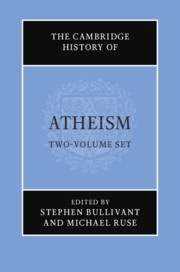Book contents
- The Cambridge History of Atheism
- The Cambridge History of Atheism
- Copyright page
- Dedication
- Contents
- Acknowledgments
- Contributors
- Introduction
- Part I Preliminaries
- Part II Atheisms in History
- Part III Reformation, Renaissance, Enlightenment
- Part IV Classical Modernity: Philosophical and Scientific Currents
- Part V Classical Modernity: Social and Political Currents
- Part VI Twentieth and Twenty-First Centuries: Intellectual and Artistic Currents
- Part VII Lived Atheism in the Twentieth- and Twenty-First Centuries: Case-Studies
- Part VIII Emerging Atheisms in the Twenty-First Century
- 54 New Atheism
- 55 The Internet and the Social Media Revolution
- 56 The Atheist Spring? Emerging Non-belief in the Islamic World
- 57 Intersectional Atheisms: Race, Gender, and Sexuality
- 58 Religion for Atheists? Transhumanism, Mindfulness, and Atheist Churches
- 59 Atheism Throughout the World
- Part IX Conclusion
- Index
- References
54 - New Atheism
from Part VIII - Emerging Atheisms in the Twenty-First Century
Published online by Cambridge University Press: 25 September 2021
- The Cambridge History of Atheism
- The Cambridge History of Atheism
- Copyright page
- Dedication
- Contents
- Acknowledgments
- Contributors
- Introduction
- Part I Preliminaries
- Part II Atheisms in History
- Part III Reformation, Renaissance, Enlightenment
- Part IV Classical Modernity: Philosophical and Scientific Currents
- Part V Classical Modernity: Social and Political Currents
- Part VI Twentieth and Twenty-First Centuries: Intellectual and Artistic Currents
- Part VII Lived Atheism in the Twentieth- and Twenty-First Centuries: Case-Studies
- Part VIII Emerging Atheisms in the Twenty-First Century
- 54 New Atheism
- 55 The Internet and the Social Media Revolution
- 56 The Atheist Spring? Emerging Non-belief in the Islamic World
- 57 Intersectional Atheisms: Race, Gender, and Sexuality
- 58 Religion for Atheists? Transhumanism, Mindfulness, and Atheist Churches
- 59 Atheism Throughout the World
- Part IX Conclusion
- Index
- References
Summary
The first decade of the twenty-first century in the anglophone west witnessed the emergence of a scholarly, but largely journalistic, discourse surrounding a ‘New Atheism’. As the above quotation from Thomas Zenk suggests, ‘New Atheism’ is frequently in the eye of the beholder and specifying what is to be included under this wobbly umbrella is far from a simple task. The term is most frequently understood as applying to some popular texts by four men – Richard Dawkins, Daniel Dennett, Sam Harris, and Christopher Hitchens – with some other voices, such as Ayaan Hirsi Ali, Ariane Sherine, Herman Philipse, Sikivu Hutchinson, Alom Shaha, and Michel Onfray adding elements of diversity into this predominantly English-speaking, white, cis-het boys’ club.
- Type
- Chapter
- Information
- The Cambridge History of Atheism , pp. 1007 - 1023Publisher: Cambridge University PressPrint publication year: 2021

